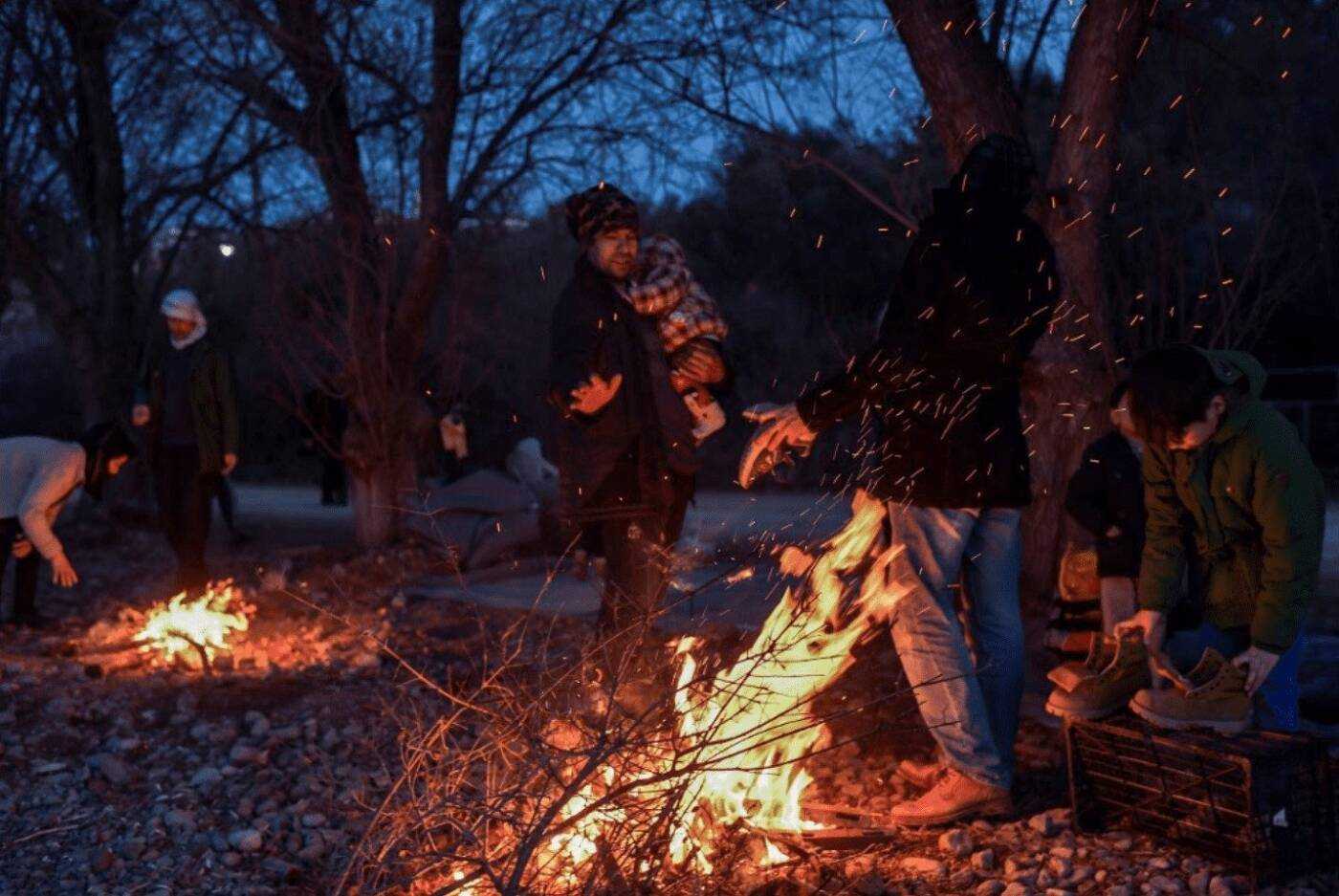Turkey, Greece use refugees as pawns in geopolitical game
Over a thousand refugees have landed at the shores of the Greek Aegean Islands in the last two days prompting Greek authorities to use “excessive force” to guard borders.
3 March 2020
Refugees put shoes to dry next to a fire on a beach in northern Greek Island of Lesvos, 2/3/2020 (AFP)
AMMAN — The number of refugees traveling to the Greek Aegean islands has soared in the last several days after the Turkish government announced it would no longer stop refugees from attempting to cross into Greece by land or sea last week.
Over a thousand refugees have landed at the shores of the Greek Aegean Islands in the last two days, according to UNHCR spokeswoman Carlotta Sami, a stark increase compared to the less than 100 people who were arriving on the islands each day on average in mid-February.
Numerous reports of boats being blocked by the Hellenic Coast Guard inside Greek waters have circulated and on Monday, Turkish authorities distributed a video that they said showed the Greek coastguard attempting to sink a rubber boat off the coast of Turkey’s Bodrum district, 12 miles from the Greek island of Kos.
Boats carrying refugees leaving Turkey for Greece have allegedly been attacked by armed men and the Greek coastguard in at least two separate incidents, Turkish officials told the Middle East Eye.
As of now, one reported death has surfaced after a boat carrying migrants capsized off the Greek island of Lesvos. The makeshift boat carried 48 people when it entered Greek waters early Monday, according to the Aegean Boat Report (ABR), an independent, volunteer-run media site reporting on the refugee crisis in the Aegean Sea. The passengers overturned the boat as it was approached by the coast guard, according to Greek officials, who described it as a “common tactic” used by traffickers to force a rescue. Of the passengers, 46 were recovered and two unconscious children were taken to hospital in Lesvos, where one died later, ABR reported.
Locals fight back
“The [Greek] islands are in total chaos,” Tommy Olsen, founder and manager of the Norwegian Aegean Boat Report (ABT) organization, told Syria Direct.
On Lesvos, some local residents gathered at the small fishing harbor of Thermi to prevent refugees from disembarking from their boats. Angry locals blocked police vehicles from Moria camp, where new arrivals are normally registered, while journalists, volunteers, and NGO workers have been instructed by police to stay indoors to thwart attacks by local gangs, according to the ABT.
“Many people now in Lesvos are fighting against refugees saying that we have no more space for them on the island,” a resident from Lesvos told Syria Direct.
Residents are angry that refugees are being directed towards Europe and that the Greek government has not been able to develop more operative policies to control migration.
An element of the New Democracy government’s refugee policy has been to allow migrant numbers to build up on the islands as a way to discourage arrivals. However, while the capacity on the islands is outstretched, with more than 40,000 asylum seekers currently present, arrivals have not been deterred. Access to sanitation is limited, however, and reports of young people attempting suicide are prevalent.
“Things are all distorted and everyone is full of speculation,” Majd al-Rajb, a Syrian refugee at Moria Camp told Syria Direct. “We heard of several reports that are circulating on our social media groups that people are being stopped in the boats.”
No more asylum
At least 13,000 people have gathered at the formal border crossing points between Turkey and Greece, according to the UN’s International Organization for Migration (IOM). Following clashes between refugees and security forces on the border, the Greek government deployed major military forces and announced it would suspend asylum applications for a month and deport migrants entering illegally. Greece also announced that its armed forces will conduct exercises with live ammunition near the Evros land border with Turkey and the Aegean Sea.
“Our national security council has decided to increase the level of deterrence at our borders to the maximum,” Prime Minister Kyriakos Mitsotakis tweeted on Sunday evening.
The country will also begin deporting new arrivals to their home countries whenever possible, without following the usual procedure of identifying them and recording their arrival. Neither of these moves is legal under European Union law but the government announced that the latest influx of refugees “has nothing to do with international asylum law, which only concerns individual cases.”
Such measures taken by Greek officials to control the migration flow into Europe are being denounced and admonished by NGOs and human rights groups.
“The reckless measures being taken by the Greek authorities are a blatant breach of EU and international law that will put lives at risk,” Eve Geddie, Director of Amnesty International’s European Institutions Office, said in a statement. “People seeking asylum are once again being used as bargaining chips in a callous political game.”
Meanwhile, refugees and migrants continue to arrive on the Greek islands and camp at the land border while locals on Lesvos prevent boats from coming ashore. Human rights groups are urging Greek authorities to refrain from using excessive force and ensure search and rescue operations can operate at sea.







